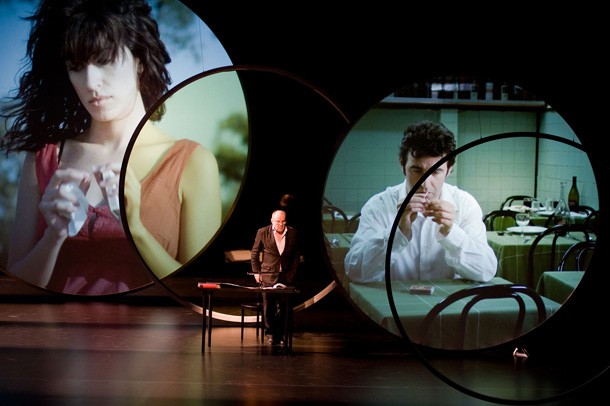Nowhere are human beings so magnificently self-assertive as in opera. Everything about operatic characters is outsize; their bodies, their flowing gowns and capacious cloaks, and their desires. No sooner has the hero set his eyes on the leading lady than he trumpets his desire to possess her; when the villain spots his victim, he tells us how he longs to send him to hell. All this fervent emotion is channelled through those great ringing voices, aided and abetted by the orchestra’s surges and swells.
It’s exhilarating to behold, partly because we envy these creatures their unbuttoned emotional life. We, by contrast, are held back by a thousand scruples and doubts. The question T.S. Eliot put into the mouth of J. Alfred Prufrock – ‘Do I dare to eat a peach?’ – is more apt for these timid feelings, or those stammering lines and silences you find in Harold Pinter. They have their own kind of truth, and a very poignant one. But it’s not a truth you could imagine being sung.
It’s not just that we operate at a lower emotional temperature than the characters in opera. Compared with them we moderns are unstable, pushed hither and thither by conflicting thoughts and uncertainties about our own selves. ‘You mustn’t look in my novels for the old stable ego of the character,’ said D.H. Lawrence, and that was a hundred years ago. Think how much more unstable our egos are now, immersed as they are in virtual realities and social media for hours at a stretch. Behind the vacuous self-assertions posted on Twitter there often lies the anxious question, do I really exist?
All this has created a problem for composers who want to engage with modern life, through the traditional apparatus of opera. They try to undercut the genre’s natural tendency towards unbuttoned straightforward emotionalism, for example by dealing in sleazy modern subjects. They work with writers who strive to capture the downbeat tone of the demotic, and designers who strive equally hard to capture an ordinary and everyday look.
But they in their turn are undercut by the genre itself, which insists on the very thing they want to deny. ‘I’m not that hero’, sings Gawain in Birtwistle’s opera of the same name, a properly right-on sentiment for an era that no longer believes in heroes. But to be heard against Birtwistle’s mighty orchestra, tenor François le Roux had to assert his modesty in a magnificently immodest ringing tone. Asserting one’s ordinariness, in a vocal style only a heroic tenor can muster, produces a deep emotional implausibility.
Where an opera successfully deals with an everyday subject, and manages to be plausible, it’s because the characters turn out to be far from everyday. In Mark-Anthony Turnage’s Anna Nicole, the singer playing the role, Eva-Marie Westbroek, was carefully dressed to suggest she was a piece of trailer-trash. But she turned out to be no ordinary nonentity; she was filled with a burning desire to become a celebrity. You could hear that passion coursing through her voice. By the end this had lifted her onto a properly tragic plane, alongside all those other tragic heroes and heroines in opera whose desires are thwarted.
Does opera simply have to throw in the towel, and admit that the special emotional climate explored by modernism, the world of half-hints and doubts and failures to be bold, is simply beyond it? Not if the success of Michel van der Aa’s Book of Disquiet is anything to go by. This ‘Music Theatre for actor, ensemble and film’ as the composer describes it, caused quite a stir when it was premiered in Linz in 2009. Next week it comes to the Coronet Theatre in a new production from the London Sinfonietta.
The piece attempts to pack into 75 minutes the masterwork of Fernando Pessoa, the reclusive Portuguese writer who slipped into obscurity after his death in 1935. That’s a feat of compression even more remarkable than Andrew Davies’s recent reduction of War and Peace into six episodes for the BBC. The Book of Disquiet consists of a vast mass of disconnected writings, thrust into envelopes, and buried in the trunk of notebooks and loose sheets that constitutes Pessoa’s life’s work. They contain reflections on life, often of a startlingly original kind, mingled with autobiography and descriptions of Lisbon. We learn that these thoughts and memories belong to Bernardo Soares, a humble and solitary clerk, who was one of Pessoa’s numerous ‘heteronyms’ or literary alter egos (there are others in The Book of Disquiet, but for the sake of clarity van der Aa eliminates them).
Soares is the quintessential anti-hero of modernism, who observes but never acts, and appears to have no desires whatever. We see him pacing about in a cocoon of his own impressions and memories, reflected back at him from the video screens all round. A small but richly coloured orchestra, augmented by electronics, couches his words in an atmosphere of fluttering anxiety. ‘I have done nothing but dream,’ he tells us. ‘This and only this has been the meaning of my life… I bear the wounds of all the battles I have avoided.’
How does van der Aa render such anti-operatic sentiments in song? The answer is, he doesn’t. Soares’s words are spoken by an actor, and the only singing in the opera comes from a mysterious woman whom Soares dreams about after he sees her in a lithograph. Could a piece with no singing be the future of music-theatre? It seems a perverse idea. But this beautiful and haunting piece suggest that it could be one way forward, for a genre that still struggles to speak convincingly of the ways we live now.






Comments